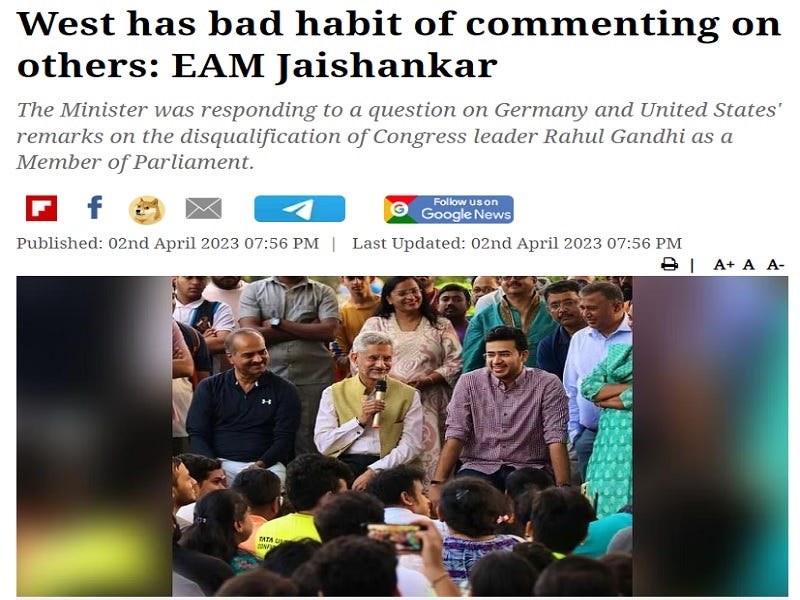India Effectively Responded To Western Meddling In Its Internal Affairs
The Golden Billion must always be put in check every time it meddles in India’s internal affairs, while their self-interested fellow travelers in that country should be publicly shamed for facilitating foreign powers’ efforts to undermine the integrity of India’s national model of democracy. It’s only through the consistent and highly-publicized practice of these complementary “Democratic Security” policies that India can prevent the Overton Window from shifting against its objective national security interests.
Indian External Affairs Minister (EAM) Dr. Subrahmanyam Jaishankar recently explained why the West meddles in his country’s internal affairs. Here’s what he said:
“There are two reasons. It is because the West has had a bad habit for a long time of commenting on others. They somehow think it is some kind of God-given right. They will have to learn only by experience that if they keep doing this, other people will also start commenting and they will not like it when it happens. I see that happening.
The second part of the truth -- in our arguments, you are inviting the people to comment on you. Then more and more people are tempted to comment. We also need to stop giving generous invitations to the world saying there are problems in India; America and Europe, why are you standing by and doing nothing?
So if somebody from here goes and says 'why are you standing by and saying nothing', then obviously they are going to comment. Part of the problem is them, part of the problem is us. And I think both need fixing.”
This was an effective response since it addresses the two driving forces behind this meddling, which will now be elaborated upon.
On the one hand, it’s true that the US-led West’s Golden Billion continues formulating policy based on the false premise of this de facto New Cold War bloc’s “exceptionalism/supremacy”, thus accounting for why they meddle in the first place as well as why they think they can do so with impunity. On the other hand, however, there also exist some self-interested domestic forces who prompt them to do so by creating the pretext for this to be done in a way that disguises their hegemonic intentions.
These two actors are in a symbiotic relationship: the Golden Billion appreciates ideologically aligned liberal-globalists in India artificially manufacturing the pretext for them to politically intervene in that country, while the latter require the former’s influence in order to successfully pressure the state. Each can pursue their overlapping goals on their own, but they stand a greater chance at achieving something tangible by working together, whether via coincidental convergence of interests or shadowy collusion.
Absent evidence of the second-mentioned intention, there’s nothing illegal about this, though it’s arguably immoral in most cases except those extreme ones such as where indisputable human rights violations are being carried out on a massive scale for instance. That’s not happening in India, though, which is why it can be assessed that those self-interested domestic forces that are in the aforesaid symbiotic relationship with the Golden Billion are economic and/or ideological opportunists.
Senior opposition figure Shashi Tharoor politely objected to EAM Jaishankar’s response to the West’s latest meddling into their country’s internal affairs with the following advice: “I think we need not be so thin-skinned. I think it's very important that as a government we learn to take some things in stride. If we start reacting to every comment, we are really doing ourselves a disservice.” With all due respect to this official, he doesn’t seem to properly grasp the concept of “Democratic Security”.
This refers to counter-Hybrid Warfare tactics and strategies aimed at preemptively averting the external exacerbation of preexisting internal differences or most effectively reacting to this process after it’s already set into motion. The preceding plot is carried out to advance a foreign power’s political agenda in ways that undermine the integrity of its targeted state’s national model of democracy instead of working through legally established mechanisms.
“Democratic Security” has always been important for ensuring the unity of India’s cosmopolitan civilization-state, but it’s become more urgent than ever in the face of Color Revolution financier George Soros’ de facto declaration of Hybrid War against India during February’s Munich Security Conference. It’s beyond the scope of the present piece to rehash the details from then, but intrepid readers can learn more about it here, here, and here. The point is that this development spiked the dangers facing India.
With a view towards fulfilling his government’s “Democratic Security” obligations, EAM Jaishankar felt compelled to nip Western meddling narratives in the bud so as to prevent them from maturing, at which time they could be exploited in the worst-case scenario to impose sanctions. The Indian National Congress opposition struggles to understand the importance of dealing with related hybrid threats directly and right away, hence other senior leaders’ disapproval of this policy like P. Chidambaram’s.
It's incumbent on Delhi not to cede any ground when it comes to the West’s efforts to gradually shift the Overton Window in the direction of “normalizing” their meddling in its internal affairs lest India ultimately open itself up to a plethora of multidimensional hybrid threats in that worst-case scenario. It’s this extremely sensitive “Democratic Security” context that explains EAM Jaishankar’s latest response, which importantly called out the two symbiotic forces involved in this process.
The Golden Billion must always be put in check every time it meddles in India’s internal affairs, while their self-interested fellow travelers in that country should be publicly shamed for facilitating foreign powers’ efforts to undermine the integrity of India’s national model of democracy. It’s only through the consistent and highly-publicized practice of these complementary “Democratic Security” policies that India can prevent the Overton Window from shifting against its objective national security interests.




